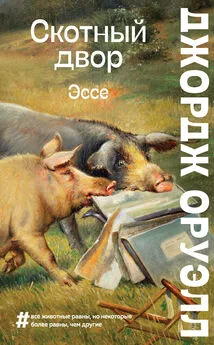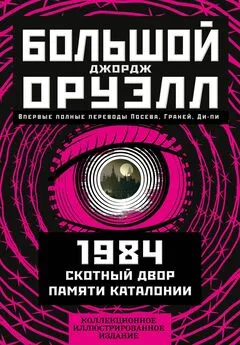Джордж Оруэлл - 1984. Скотный двор
- Название:1984. Скотный двор
- Автор:
- Жанр:
- Издательство:неизвестно
- Год:неизвестен
- ISBN:нет данных
- Рейтинг:
- Избранное:Добавить в избранное
-
Отзывы:
-
Ваша оценка:
Джордж Оруэлл - 1984. Скотный двор краткое содержание
1984: Своеобразный антипод второй великой антиутопии XX века - "О дивный новый мир" Олдоса Хаксли. Что, в сущности, страшнее: доведенное до абсурда "общество потребления" - или доведенное до абсолюта "общество идеи"? По Оруэллу, нет и не может быть ничего ужаснее тотальной несвободы.
Скотный двор: Антиутопия английского писателя Дж. Оруэлла. Животные, возмущенные отношением к ним хозяев, устраивают бунт и прогоняют фермеров, а бывшую ферму объявляют свободной республикой под управлением свиней. Сначала все идет гладко, но затем рядовые животные понимают, что они также находятся в рабстве, только теперь у своих же собратьев.
1984. Скотный двор - читать онлайн бесплатно ознакомительный отрывок
Интервал:
Закладка:
| The paint was plastered so thick on her face that it looked as though it might crack like a cardboard mask. | Румяна лежали на лице таким толстым слоем, что, казалось, треснут сейчас, как картонная маска. |
| There were streaks of white in her hair; but the truly dreadful detail was that her mouth had fallen a little open, revealing nothing except a cavernous blackness. | В волосах седые пряди; и самая жуткая деталь: рот приоткрылся, а в нем -- ничего, черный, как пещера. |
| She had no teeth at all. | Ни одного зуба. |
| He wrote hurriedly, in scrabbling handwriting: | Торопливо, валкими буквами он написал: |
| When I saw her in the light she was quite an old woman, fifty years old at least. | Когда я увидел ее при свете, она оказалась совсем старой, ей было не меньше пятидесяти. |
| But I went ahead and did it just the same. | Но я не остановился и довел дело до конца. |
| He pressed his fingers against his eyelids again. | Уинстон опять нажал пальцами на веки. |
| He had written it down at last, but it made no difference. | Ну вот, он все записал, а ничего не изменилось. |
| The therapy had not worked. | Лечение не помогло. |
| The urge to shout filthy words at the top of his voice was as strong as ever. | Выругаться во весь голос хотелось ничуть не меньше. |
| Chapter 7 | VII |
| 'If there is hope,' wrote Winston, 'it lies in the proles.' | Если есть надежда (писал Уинстон), то она в пролах. |
| If there was hope, it MUST lie in the proles, because only there in those swarming disregarded masses, 85 per cent of the population of Oceania, could the force to destroy the Party ever be generated. | Если есть надежда, то больше ей негде быть: только в пролах, в этой клубящейся на государственных задворках массе, которая составляет восемьдесят пять процентов населения Океании, может родиться сила, способная уничтожить партию. |
| The Party could not be overthrown from within. | Партию нельзя свергнуть изнутри. |
| Its enemies, if it had any enemies, had no way of coming together or even of identifying one another. | Ее враги -- если у нее есть враги -- не могут соединиться, не могут даже узнать друг друга. |
| Even if the legendary Brotherhood existed, as just possibly it might, it was inconceivable that its members could ever assemble in larger numbers than twos and threes. | Даже если существует легендарное Братство -- а это не исключено, -- нельзя себе представить, чтобы члены его собирались группами больше двух или трех человек. |
| Rebellion meant a look in the eyes, an inflexion of the voice, at the most, an occasional whispered word. | Их бунт -- выражение глаз, интонация в голосе; самое большее -- словечко, произнесенное шепотом. |
| But the proles, if only they could somehow become conscious of their own strength. would have no need to conspire. | А пролам, если бы только они могли осознать свою силу, заговоры ни к чему. |
| They needed only to rise up and shake themselves like a horse shaking off flies. | Им достаточно встать и встряхнуться -- как лошадь стряхивает мух. |
| If they chose they could blow the Party to pieces tomorrow morning. | Стоит им захотеть, и завтра утром они разнесут партию в щепки. |
| Surely sooner or later it must occur to them to do it? | Рано или поздно они до этого додумаются. |
| And yet—! | Но!.. |
| He remembered how once he had been walking down a crowded street when a tremendous shout of hundreds of voices women's voices--had burst from a side-street a little way ahead. | Он вспомнил, как однажды шел по людной улице, и вдруг из переулка впереди вырвался оглушительный, в тысячу глоток, крик, женский крик. |
| It was a great formidable cry of anger and despair, a deep,loud | Мощный, грозный вопль гнева и отчаяния, густое |
| 'Oh-o-o-o-oh!' that went humming on like the reverberation of a bell. | "A-а-а-а!", гудящее, как колокол. |
| His heart had leapt. | Сердце у него застучало. |
| It's started! he had thought. | Началось! -- подумал он. |
| A riot! | Мятеж! |
| The proles are breaking loose at last! | Наконец-то они восстали! |
| When he had reached the spot it was to see a mob of two or three hundred women crowding round the stalls of a street market, with faces as tragic as though they had been the doomed passengers on a sinking ship. | Он подошел ближе и увидел толпу: двести или триста женщин сгрудились перед рыночными ларьками, и лица у них были трагические, как у пассажиров на тонущем пароходе. |
| But at this moment the general despair broke down into a multitude of individual quarrels. | У него на глазах объединенная отчаянием толпа будто распалась: раздробилась на островки отдельных ссор. |
| It appeared that one of the stalls had been selling tin saucepans. | По-видимому, один из ларьков торговал кастрюлями. |
| They were wretched, flimsy things, but cooking-pots of any kind were always difficult to get. | Убогие, утлые жестянки -- но кухонную посуду всегда было трудно достать. |
| Now the supply had unexpectedly given out. | А сейчас товар неожиданно кончился. |
| The successful women, bumped and jostled by the rest, were trying to make off with their saucepans while dozens of others clamoured round the stall, accusing the stall-keeper of favouritism and of having more saucepans somewhere in reserve. | Счастливицы, провожаемые толчками и тычками, протискивались прочь со своими кастрюлями, а неудачливые галдели вокруг ларька и обвиняли ларечника в том, что дает по блату, что прячет под прилавком. |
| There was a fresh outburst of yells. | Раздался новый крик. |
| Two bloated women, one of them with her hair coming down, had got hold of the same saucepan and were trying to tear it out of one another's hands. | Две толстухи -- одна с распущенными волосами -- вцепились в кастрюльку и тянули в разные стороны. |
| For a moment they were both tugging, and then the handle came off. | Обе дернули, ручка оторвалась. |
| Winston watched them disgustedly. | Уинстон наблюдал с отвращением. |
| And yet, just for a moment, what almost frightening power had sounded in that cry from only a few hundred throats! | Однако какая же устрашающая сила прозвучала в крике всего двухсот или трехсот голосов! |
| Why was it that they could never shout like that about anything that mattered? | Ну почему они никогда не крикнут так из-за чего-нибудь стоящего! |
| He wrote: | Он написал: |
| Until they become conscious they will never rebel, and until after they have rebelled they cannot become conscious. | Они никогда не взбунтуются, пока не станут сознательными, а сознательными не станут, пока не взбунтуются. |
| That, he reflected, might almost have been a transcription from one of the Party textbooks. | Прямо как из партийного учебника фраза, подумал он. |
| The Party claimed, of course, to have liberated the proles from bondage. | Партия, конечно, утверждала, что освободила пролов от цепей. |
| Before the Revolution they had been hideously oppressed by the capitalists, they had been starved and flogged, women had been forced to work in the coal mines (women still did work in the coal mines, as a matter of fact), children had been sold into the factories at the age of six. | До революции их страшно угнетали капиталисты, морили голодом и пороли, женщин заставляли работать в шахтах (между прочим, они там работают до сих пор), детей в шесть лет продавали на фабрики. |
| But simultaneously, true to the Principles of doublethink, the Party taught that the proles were natural inferiors who must be kept in subjection, like animals, by the application of a few simple rules. | Но одновременно, в соответствии с принципом двоемыслия, партия учила, что пролы по своей природе низшие существа, их, как животных, надо держать в повиновении, руководствуясь несколькими простыми правилами. |
| In reality very little was known about the proles. | В сущности, о пролах знали очень мало. |
| It was not necessary to know much. | Много и незачем знать. |
| So long as they continued to work and breed, their other activities were without importance. | Лишь бы трудились и размножались -- а там пусть делают что хотят. |
| Left to themselves, like cattle turned loose upon the plains of Argentina, they had reverted to a style of life that appeared to be natural to them, a sort of ancestral pattern. | Предоставленные сами себе, как скот на равнинах Аргентины, они всегда возвращались к тому образу жизни, который для них естествен, -- шли по стопам предков. |
| They were born, they grew up in the gutters, they went to work at twelve, they passed through a brief blossoming-period of beauty and sexual desire, they married at twenty, they were middle-aged at thirty, they died, for the most part, at sixty. | Они рождаются, растут в грязи, в двенадцать лет начинают работать, переживают короткий период физического расцвета и сексуальности, в двадцать лет женятся, в тридцать уже немолоды, к шестидесяти обычно умирают. |
| Heavy physical work, the care of home and children, petty quarrels with neighbours, films, football, beer, and above all, gambling, filled up the horizon of their minds. | Тяжелый физический труд, заботы о доме и детях, мелкие свары с соседями, кино, футбол, пиво и, главное, азартные игры -- вот и все, что вмещается в их кругозор. |
| To keep them in control was not difficult. A few agents of the Thought Police moved always among them, spreading false rumours and marking down and eliminating the few individuals who were judged capable of becoming dangerous; but no attempt was made to indoctrinate them with the ideology of the Party. | Управлять ими несложно Среди них всегда вращаются агенты полиции мыслей -выявляют и устраняют тех, кто мог бы стать опасным; но приобщить их к партийной идеологии не стремятся. |
| It was not desirable that the proles should have strong political feelings. | Считается нежелательным, чтобы пролы испытывали большой интерес к политике. |
Интервал:
Закладка:

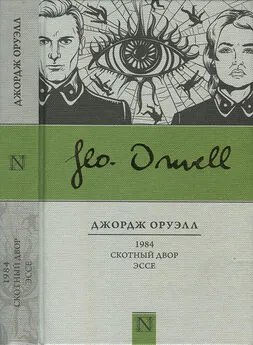
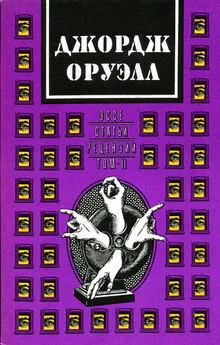
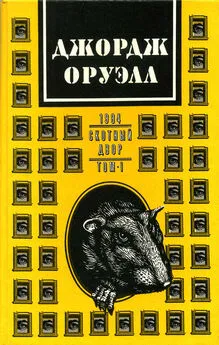
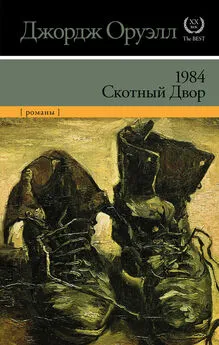
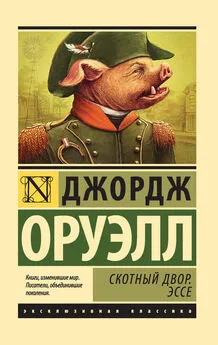
![Джордж Оруэлл - Скотный двор. Эссе [сборник litres]](/books/1143542/dzhordzh-oruell-skotnyj-dvor-esse-sbornik-litres.webp)
